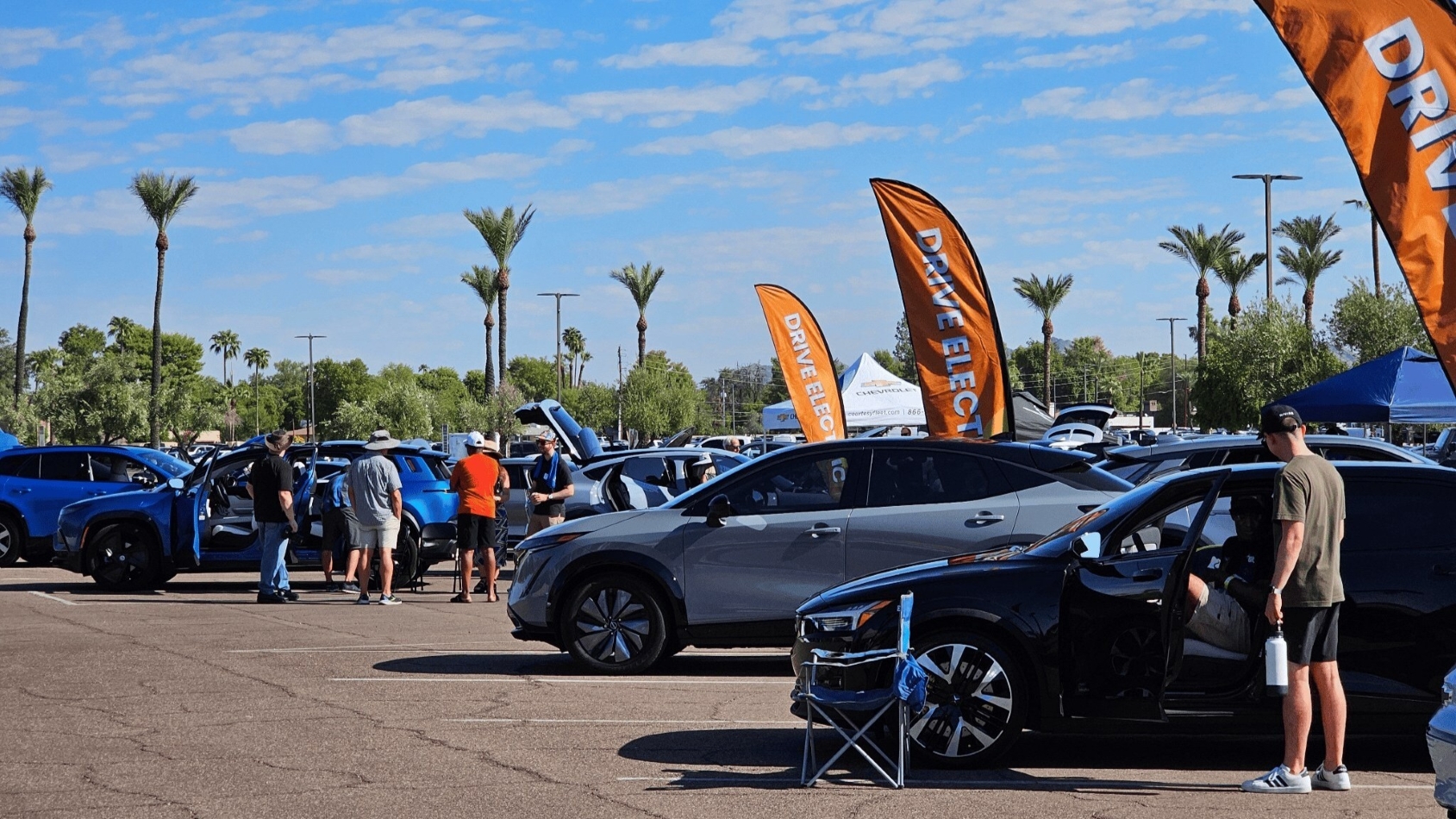EV news: National Drive Electric Month is underway; pros, cons of home chargers

National Drive Electric Month runs through Oct. 12, with events scheduled in 41 states. Photo courtesy of Plug In America.
By subscribing, you agree to receive communications from Auto Remarketing and our partners in accordance with our Privacy Policy. We may share your information with select partners and sponsors who may contact you about their products and services. You may unsubscribe at any time.
National Drive Electric Month is underway.
The annual campaign to increase education and awareness about electric vehicles began Friday and runs through Oct. 12, with events planned in 41 states featuring EV test drives, vehicle showcases, informative workshops and other activities designed to illustrate the benefits of switching to an electric vehicle.
“NDEM events are where the magic happens,” said Joel Levin, executive director of Plug In America, an EV advocacy nonprofit and an organizing partner of NDEM. “EV drivers love their cars and sharing that experience with others.
“The passion and enthusiasm are palpable at National Drive Electric Month events, where people can often test drive EVs to understand why EVs are so beloved. After a test drive, that’s when it really clicks for a lot of people. They understand why EV drivers go out of their way to talk about EVs with everyone.”
In a news release Plug In America pointed out the recent explosion of EV models, with more than 400 electric model trims available, as well as the strong used EV market, and noted consumers can still take advantage of the federal EV tax credits through Sept. 30.
“There are a lot of great deals available right now, and I encourage anyone considering an EV to act quickly to maximize savings,” Levin said.
Subscribe to Auto Remarketing to stay informed and stay ahead.
By subscribing, you agree to receive communications from Auto Remarketing and our partners in accordance with our Privacy Policy. We may share your information with select partners and sponsors who may contact you about their products and services. You may unsubscribe at any time.
This year’s National Drive Electric Month is presented by Plug In America, the Electric Vehicle Association, EVHybridNoire, the Sierra Club and Drive Electric USA, which recruit organizers to host local events that are then listed on DriveElectricMonth.org.
This year that listing includes multiple events in Hawaii and Alaska.
The companies highlighted some notable upcoming events, including:
- The Son Of A Sailor Fest, Sept. 20 in Mobile, Ala., which celebrates Jimmy Buffett and Gulf Coast culture. The free festival features live music, local restaurants, parrothead costume contests and EV drivers to answer questions about driving electric.
- A car show in downtown Grand Junction, Colo., with a dedicated EV block and competition with prizes.
- Plug In America’s ride-and-drive at the Space Coast Pride Parade & Festival, Sept. 27 in Melbourne, Fla. The public can test drive EVs from various manufacturers, engage with local EV owners and talk to EV experts.
- Demos by the Oregon Electric Vehicle Association in Portland and at Mesa Community College in Mesa, Ariz., offering test drives, vehicle displays and educational talks, with EV owners on hand to answer questions.
Mercury Insurance spells out pros and cons of home EV chargers
With the majority of EV charging coming from home chargers, Mercury Insurance wants to make sure car shoppers considering EVs are educated about them.
“Installing an EV charger in your home is a major decision,” Mercury Insurance director of strategic planning and ERM Steve Ward said. “It’s important to carefully consider all aspects of this purchase.”
In a news release, the insurance carrier said since the average cost of a home EV charger ranges from $1750-$2500 — not including installation — it recommends reviewing the pros and cons of home charging stations before purchasing.
Mercury said the pros include:
Convenience: Charging an EV overnight, ensures it’s ready to go each morning without needing to visit a public station.
Cost savings: Home charging is generally cheaper than public rates, especially when charging during off-peak hours.
Property value: A home EV charger can add value to a home, making it more attractive to potential buyers.
Environmental benefits: Owners can more easily power EVs with renewable energy sources to reduce their carbon footprint.
Flexibility: Smart chargers can be managed, scheduled and tracked through mobile apps, allowing for better control of charging habits.
Among the cons:
Upfront costs: The initial investment for the charger, installation labor and potential electrical upgrades can be substantial.
Accessibility: For those living in an apartment or condominium, or who don’t have a private parking spot, installing a home charger can be challenging or impossible.
Electrical requirements: Older homes or buildings might not have the necessary wiring to support a home charger, requiring expensive electrical work to meet the power demands.
Installation: Finding a qualified installer and dealing with potential restrictions from a homeowners association or local government can add complexity to the process.
“Reviewing these pros and cons can help you decide if the cost outlay for an EV charger is worth it,” Ward said.
Mercury cited J.D. Power studies that found Level 2 mounted chargers have the highest level of consumer satisfaction, though wi-fi connectivity and charger app problems can still issues.


